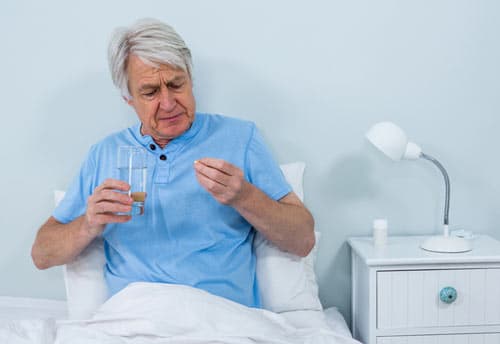Blood-thinning drugs are supposed to cut your risk of having a stroke. That’s the main reason millions of Americans who suffer from atrial fibrillation take them.
These medications include Coumadin (warfarin), Eliquis (apixaban), Pradaxa (dabigatran), and Xarelto (rivaroxaban).1
An alarming new study shows that in many people these drugs actually increase the chances of having a stroke.
Blood Thinners: Unintended—and Deadly—Consequences
Researchers from the University College London and the University of Surrey studied 4,848 people over 65 with atrial fibrillation. About 6 million Americans suffer from it.
It is a heart condition characterized by irregular and often rapid heart heartbeat. Atrial fibrillation causes blood to pool in the heart. This leads to blood clots that can travel to the brain, causing a stroke. Blood-thinning drugs are the standard preventive measure.2
In the new study, scientists looked at patients with both atrial fibrillation and chronic kidney disease (CKD).
Half the subjects were on blood-thinning medications. The researchers then monitored the participants for a year and a half.
They found that the subjects taking anticoagulants were 2.6 times more likely to have a stroke than those not taking the drugs. And they were 2.4 times more likely to have a hemorrhage.<a3
Blood Thinners Put Millions of Patients at Risk
More than 2 million Americans may be at risk. That’s the estimated number of patients with both atrial fibrillation and CKD who are taking blood thinners.4 5
Dr. Shankar Kumar is with the University College London’s Centre for Medical Imaging. He led the study. “We found that in this particular group, their medication seems to do the opposite of its intended effect,” he said.6
Dr. Kumar said many doctors don’t know that prescribing blood thinners to a kidney patient can set them up for a stroke.
His study recently was published in the British Medical Journal.
If You Take a Blood Thinner, Do This…
If you are on blood thinners, don’t stop taking them. But ask your doctor to test you for CKD.
In the early stages of the disease, most people do not have any symptoms. CKD can strike at any age, but usually occurs after age 60. It is more common in women.7
Your doctor can check you for CKD with simple blood and urine tests. If you test positive, discuss alternatives that you can use in place of risky drugs.
5 Natural Alternatives to Blood-Thinning drugs
Here are five natural blood-thinners that have few—if any—side effects. If you have atrial fibrillation and CKD, they may be safer than prescription anticoagulants. Be sure to talk to your doctor before you begin taking them.
- Turmeric: This is a spice commonly used in Indian cooking. It is a powerful anti-inflammatory. Take a 500 mg supplement three times a day.
- Cayenne pepper: In supplement form, it is a fast-acting blood thinner. Take 450 mg three times a day with food.
- Omega-3 fatty acids: Great food sources include wild-caught salmon, anchovies, albacore tuna, herring, walnuts, olive and flax seed oils, and pumpkin seeds. Eat at least one of these twice a week… Or take a daily omega-3 supplement as directed by the label.
- Bromelain: This enzyme is found in pineapples. Take a 400 mg supplement three times a day on an empty stomach.
- Garlic: Raw garlic is preferable. But it may be too pungent for some. Instead, try a supplement. Follow the dosing directions on the label.
One more thing… The simplest anticoagulant is water. Yes, plain water.
It’s one of nature’s most effective blood thinners. Drink ½ ounce of water for every pound of your body weight each day. So a 180-pound man would need 90 ounces or about three quarts of water a day. People who eat a lot of fruits and vegetables may need less.
Editor’s Note: The American Heart Association admits more than half of men who die of heart disease show no symptoms. But it’s not because the symptoms weren’t there… Doctors just couldn’t find them.
Discover the little-known test that detects heart disease quicker than the ones used in every doctor’s office across the country… And how a natural “warrior extract” can treat it without causing dangerous side effects.
Get all the details HERE.
Like this Article? Forward this article here or Share on Facebook.
References:
1 https://www.webmd.com/heart-disease/atrial-fibrillation/features/warfarin-new-blood-thinners#1
2 https://www.kidney.org/news/newsroom/factsheets/KidneyDiseaseBasics
3 https://medicalxpress.com/news/2018-02-blood-thinners-over-65s-kidney-disease.html
4 http://www.prb.org/Publications/Media-Guides/2016/aging-unitedstates-fact-sheet.aspx
5 https://www.ons.gov.uk/peoplepopulationandcommunity/populationandmigration/populationestimates/articles/overviewoftheukpopulation/july2017
6 https://www.theguardian.com/science/2018/feb/15/blood-thinning-drugs-designed-to-cut-stroke-risk-may-actually-increase-it
7 https://www.kidney.org/news/newsroom/factsheets/KidneyDiseaseBasics

